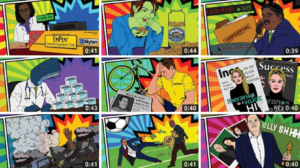
Ethics Unwrapped designed by McCombs School of Business uses illustrated and animated videos to teach the science of everyday ethics. Courtesy photo
Corporate scandals are common place these days. From fraudulent accounts created by Wells Fargo to the real life Papa John using a racial epithet as unforgiving as the N-word. One would think the business ethics lessons would be loud and clear, yet no sooner than one controversy ends, another appears.
No doubt, business schools are making a good faith effort to address this unsettling trend. Partly because B-schools are often targeted as the cause or accused of not doing enough to curb unethical decision-making, it’s nearly impossible to find one without some kind of ethics component baked into its teaching curriculum. One in particular is gaining in popularity and being adopted by top-tier institutions far and near including Naval War College and Harvard, Stanford, Columbia, and Oxford universities.
88% SAY ‘ETHICS UNWRAPPED’ BOOSTS THEIR ETHICS CONFIDENCE
Ethics Unwrapped is a video-based ethics curriculum that was created by the University of Texas at Austin McCombs School of Business in 2011. Specifically by Cara Biasucci, a filmmaker, author, and educational designer brought to McCombs to create the video series. What started simply as a way to help students navigate real-world ethics dilemmas has flourished into more than 125 short videos and accompanying resources such as case studies and teaching guides that have found their way to more than 1,200 campuses in over 170 different countries. What’s more, new research by Biasucci and Ethics Unwrapped Faculty Director Robert Prentice confirms that the curriculum is indeed awakening moral awareness among students who are exposed to it.

Filmmaker and author Cara Biasucci of McCombs Business School is the creator and program director of Ethics Unwrapped. Photo courtesy of McCombs
A two-year study of 8,600 University of Texas-Austin undergraduate students found that Ethics Unwrapped videos appear to increase students’ understanding of ethics and human behavior. After viewing the videos, 88% reported feeling either confident or very confident understanding ethics and human behavior and 90% reported that watching the videos helped them better understand ethics concepts. This, compared to more than half declaring insufficient confidence in their ability to identify, discuss, or apply ethics concepts such as conflict of interest, conformity bias, and relativism prior to their exposure to McCombs’ ethics video content.
SCANDALS ILLUSTRATED
The X-factor for Ethics Unwrapped is that it’s behavior-centric. “The most significant problem is not psychopaths in the C-Suites — although there are some of those — or people waking up one day and vowing, ‘Today is the day I start my life of crime,’” says Prentice. “Instead, the most important question is, ‘Why do good people do bad things?’”
This is the salient query behind the program which seeks to unwrap and dissect ethics behaviors beyond mere terms and lecture discussions. Dozens of behavioral ethics topics are found on the free-to-anyone Ethics Unwrapped website and brought to life through illustrated and animated videos.
One such topic, obedience to authority, is unpacked to show how a tendency to please authority figures can lead to immoral and unethical decisions. In another series, suitably titled Scandals Illustrated, 30 one-minute videos summarize recent high-profile scandals through the lens of behavioral ethics. It includes such controversial cases as United Airlines forcibly removing a passenger, account fraud at Wells Fargo, and the sexual abuse scandal that rocked Pennsylvania State University’s football team in 2012.
ETHICS CURRICULUM THAT SPEAKS TO THE HEART, NOT JUST THE HEAD
Behavioral ethics goes a step beyond philosophy which assumes that people will behave as they should if they know right from wrong — and economics, which assumes people rationally weigh the pros and cons of their ethical decisions, Biasucci and Prentice say in their research study. “It helps close the gap between what people know that they should do, and what they actually choose to do,” the two say.
Adding to this is the chosen delivery method for Ethics Unwrapped which is video. “We’re using the medium of film in its full capacity, to tell stories that appeal to the students’ emotional and moral sense as well as to the thinking part of their brain ,” Biasucci says. “To their hearts as well as their heads.”
“Millennials and Gen-Zers spend more than 50% of their waking time on screens,” Biasucci adds. “This program meets them where they’re at, with a video format that appeals to their emotional and moral sense as well as the thinking part of their brain.”
Since inception, Ethics Unwrapped videos have been viewed more than a million times and accumulated a collection of awards. They’ve also managed to cross academic lines, penetrating disciplines outside of business including fine arts, education, and natural sciences.
DON’T MISS: AT KELLEY, GAMES HELP SOLVE ETHICAL PUZZLES or THE BEST LESSONS YOU’LL LEARN IN BUSINESS SCHOOL










